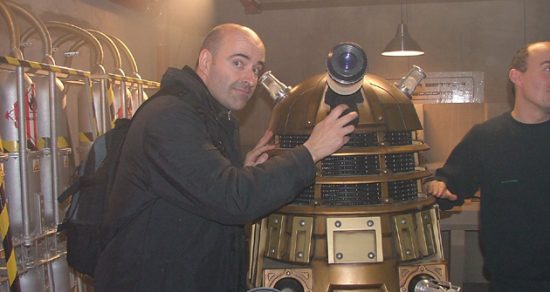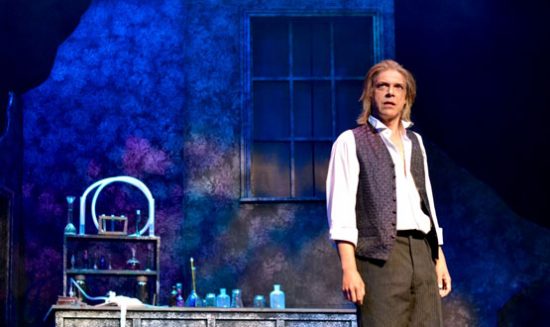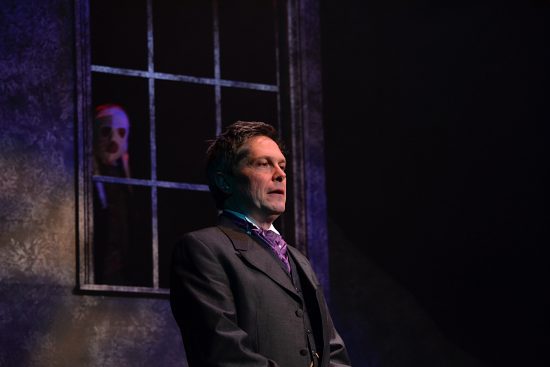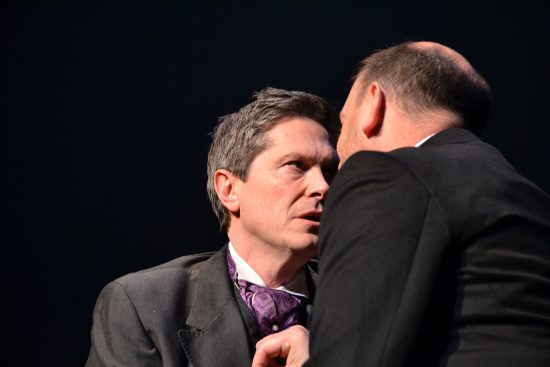Live for Films talks to the voice of the Daleks: Nicholas Briggs
To his fans across the world Nicholas Briggs is known as the legendary voice of the Daleks, a sacred member of the Doctor Who clan; co-author of The Dalek Survival Guide and co-executive producer of Big Finish Productions, the hugely successful company licensed by the BBC to make Doctor Who audio drama.
He admits he has Doctor Who “in his blood”, having been involved since its revival in 2005, but this multi-talented performer, writer and producer is also a composer, playwright and director, as demonstrated by his latest project, JEKYLL AND HYDE, a theatrical adaptation of Robert Louis Stevenson’s classic story. Briggs has written and directed this “rip-roaring thriller”, which embarks on a national tour from 2 May – 30 Sept 2016.
His diverse acting credits include: Doctor Who spin-off Torchwood, playing Special Government Advisor Rick Yates; the films Adulthood and 4.3.2.1, both written and directed by fellow Doctor Who actor Noel Clarke; and Sherlock Holmes in Holmes and the Ripper and The Hound of the Baskervilles.
I recently caught up with Nicholas to discuss how one goes about becoming the voice of the Daleks, working with Noel Clarke, his new play, and being with Benedict Cumberbatch the moment he knew he was Sherlock Holmes.
Hi Nicholas. I’m Alan from Live for Films. How are you?
Alright. Yes.
Good. It’s good to talk to you. To begin with, obviously you’re the voice of the Daleks…
Mmm hmm. That’s true.
…How did that come about? How does one become the voice of the Daleks?
It was a sort of a strange route. I started practicing when I was about five, and strangely enough I was quite preoccupied with the voice actually. As a kid, I was always trying to impersonate it, and fiddling around with tape recorders, and screaming into microphones – not really understanding what went into making the actual electronic noise.
Then, in 1999, I was involved with the creation of the Doctor Who audio adventures from Big Finish, and soon after we started we got an agreement from the Terry Nation estate to do Dalek stories. I was trained as an actor AND had that entire childhood of making Dalek noises behind be, and I said to the producer at the time, “Will it be alright for me to do the Dalek voices, or do you want to see a grown man cry?”
Everyone seemed to like it, no one said, “Oh, this doesn’t sound like a Dalek”, quite the opposite. Then when the TV series came back, it turned out that Russell T. Davies had been listening to our CD’s and not only had he heard me do the Dalek voices – and think I was good enough – but I had also been sad enough to write an article for Doctor Who Magazine about how it was achieved and that I had all the gizmos. So, there no longer being a BBC Radiophonic Workshop, Russell knew he had to find a way to technically achieve it, and he said, “That guy, Nick Briggs, he’s the total solution”.
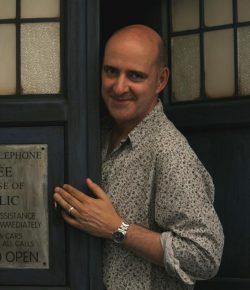 What’s the technique? If I want to do a Dalek voice what do I need? What are the keys? What are the cadences?
What’s the technique? If I want to do a Dalek voice what do I need? What are the keys? What are the cadences?
It’s a 50-50 thing, I would say. It’s like how the breath you put into a musical instrument makes the instrument work properly, and likewise the mad performance you put into doing a Dalek voice makes the ring modulator work properly. Your voice has to be put into it in a certain way – the audio has to be overloaded. You know how at a rock concert when someone shouts into a microphone and makes it distort?
Microphony? Is that what that’s called?
I have no idea?! But I like it! I’m writing it down right now. “Microphony”. Is that a word?
Yeah.
I’m looking it up now… Not according to my dictionary. It might be on the internet though, mightn’t it… Mmm, “Microphony. Describes the phenomenon where in certain components in electronic devices transform vibrations into an undesired elec…” Yeah, that sounds right. Yeah. Yeah. I’ve learnt something, thank you.
You can put that in “Dalek Survival Guide vol. 2”.
Yes, yes, I will! But then the rest of it’s acting really. It’s just believing that you’re this ghastly thing. But then there’s also the heritage of it. I’m obviously a massive Doctor Who fan, and have been for years, so I have the memory of what a Dalek voice is in my head and aim for that.
That’s the thing with Daleks though, isn’t it? They shouldn’t really be that scary anymore, but they feed of this culturally heritage and memory that we all have of being terrified of them and that voice.
At the first read through, I had the microphone and the ring modulator and did it and everyone cheered and whooped. I just looked round like a canny old performer and saw one person who had no reaction at all. And she was looking around at the rest of the group like they were insane. She had not been brought up in a country where they showed Doctor Who, so to her it had no cultural connection at all. When she was acting in one of the scenes where a Dalek was going to zap her boss, the director said to her, “Can you look a little more scared?” And she said, “What? Of THAT?!” And the director gritted her teeth and said, “It’s been killing people!” And she got it, but for her there was no buzz or reaction. People are usually naturally quite scared of it.
So how did Torchwood happen? Did that come out of your existing affiliation with the Doctor Who family, or did you approach it completely afresh?
Russell T. Davies was just leaving Doctor Who, and bless him he did say that he regretted never giving me an on-screen part in Doctor Who. He suggested me to the casting director for Torchwood for this role, but he was very keen to stress that he just put my name forward – he didn’t say, “You’ve got to give him the job”. So, yeah, I got the opportunity because I was part of the family, but HOPEFULLY I got the job on merit. (laughing) But who knows the truth?
And you have appeared in Adulthood and 4.3.2.1. which are both Noel Clarke films – can you tell me about working with him?
Noel and I are very… and he’s the one who has remarked on this – I am far too polite and middle class – he has often said, “I wonder what people think of the two of us walking around together?” Which is an odd comment, but it’s his comment not mine.
We met on the set of Doctor Who when we weren’t really working together… It was in… David Tennant’s first series I think… Although it might have been during the Chris Ecclestone time… But just by chance we were put in the same car to go back to the hotel and we just got chatting. All sorts of stuff: his character, the show, all sorts of stuff. And he – straight forward kind of guy – said, “Gimme your number, Briggsy. We’re going to be friends”. So I gave him my number and we’ve been friends ever since.
He’s always been very loyal and supportive to me. He wrote a Torchwood script, and in every single draft he included a character and in brackets put “(to be played by Nicholas Briggs)”. Unfortunately, in the last rewrite he phoned me up and said, “Briggsy, they made me cut that character out. I’m sorry, I’m so sorry”. I think he should have left my name off it, and they might’ve kept it in.
Likewise, with Adulthood and 4.3.2.1., he said, “I’d love you to be in my film”. He did want me to be in all his films, but it didn’t happen. I bumped into him the other day…
Did you pull him up?
I should have mentioned that I wasn’t in Brotherhood – but I’m not sure how I would have fit into that film! He kept texting me during the editing process of Adulthood saying, “I haven’t cut you yet, Briggsy, I haven’t cut you”, and I was like, “Here’s the thing: I’m in the scene where the main character is sacked from her job, and the only reason that everything else happens to her in the film happens because of that scene, and I know that you shot that scene handheld in one shot – so you can’t cut me. You’re stuck!
What is the main difference, as an actor, transitioning from TV to film?
Time. I remember David Tennant saying when he went off to do that Harry Potter film, that he did his scene, went off for a few months and came back, and they were still working on that scene! As an actor, the main difference is between TV and film and audio and theatre – because you have more control as an actor. You can be doing the most marvellous piece of acting in film or TV and the director might decide that the reaction of the person you’re talking to is far more interesting and, you know. The audience don’t listen to what’s not on screen.
On the subject of your theatre work, you have played Sherlock Holmes twice on stage. How do you go about preparing to play Holmes?
Really single-minded. Focussed. Really sharp thinking. It’s a real bugger to play because – especially in the theatre and you haven’t had a tremendous amount of rehearsal time – what actors do… when actors are doing weekly rep you’ll notice that they always find elements of the character that give them thinking time. So the character might be a little… vague, or coughing, which incidentally is what Patrick Troughton, the second Doctor, did. A brilliant performance, but brilliant largely at how he covered the fact that he didn’t know the lines! You can’t do that with Sherlock Holmes because he is so sure, and his mind is like a razor. There’s no hiding place when you’re Holmes.
You worked with Mark Gatiss on Nebulous, and I’m not sure how this works with your timeline, but did you ever get to talk about Sherlock Holmes with him while he was creating the Benedict Cumberbatch version?
Well I’ve known Mark for years and years and years – which is how I got the job on Nebulous. So I’ve always known about his love of Sherlock Holmes. But I have to confess… when he said to me he was doing Sherlock Holmes in the modern day, I have to confess – and I don’t know if I’ve ever confessed this to him – I thought, “What a terrible idea”. I lied and said, “Brilliant”.
About a year later, Benedict Cumberbatch came into Big Finish to be in one of our Doctor Who things. I was chatting to someone while he was recording and moved a bag and said “Whose is this?”, and they said “Benedict’s”, and don’t forget he wasn’t massively famous then, I had been talking to him about Doctor Who and he was a massive fan, and as I moved his bag it flopped open and there was a script that said “Sherlock by Stephen Moffat and Mark Gatiss” and it all came together in my head. I thought, “I bet they’re going to ask him to be Sherlock Holmes”. So as he was coming out I said “ Well of course I’m going to Nottingham next week to play Sherlock Holmes”, and I saw out the corner of my eye, Benedict twitch.
He came over and said, “Did you say you were doing Sherlock Holmes?”, I said, “Yes. I’m doing it at The Theatre Royal, Nottingham”, and he said – and I wish I’d recorded this, or had him write it down – “Yeah, I can see that. You’d make a really good Sherlock Holmes”. Unfortunately there is no evidence whatsoever. Then he thought for a moment and said, “I probably shouldn’t say, but in my bag is a script for a new series called ‘Sherlock’, and they want ME to play Sherlock Holmes”, and I said “Wow. I think you’d be brilliant. Are you going to do it?”, and he thought for a second and said, “Yeah, I think I am”.
What a cool moment to have been there for. To tie things up, let’s go back to your stage work – can you tell me about your version of Jekyll and Hyde that is starting shortly?
The tour is up and running as we speak – they’re in sunny Weston-super-Mare. I wrote it for a thriller season that I’ve done since 1997 at Theatre Royal Nottingham. In 2014 they said that for 2016 they wanted to do something gothic and Victorian and they were thinking of Jekyll and Hyde. They had looked at a lot of the adaptations and said they didn’t really like any of them, and they wondered whether I would have a read and adapt it. I had never read it, so I got it and I had a read and really enjoyed it, and instantly saw how I could do it. So I went back and wrote it, and then directed it in summer 2015. Then a producer friend of mine asked about directing a new touring version with a completely new cast.
What makes your version of Jekyll and Hyde special, and when can we see it in London?
Well, it’s… the closest it comes is the Churchill Theatre in Bromley. What makes it special? Well it’s pretty darn faithful. The thing that struck me when I read it was that the novella is not the story that we assume it is. We’ve seen lots of film and television adaptions and most peoples experience of Jekyll and Hyde is comedy sketches – with a man drinking a potion, disappearing behind a desk, and reappearing all hairy – or just the phrase “Jekyll and Hyde”, when someone’s talking about a person who is worryingly changeable. The films… what people mainly adapt are the last few chapters.
For a modern audience, there’s no shock value in realising Jekyll changes into Hyde. In the book, just hearing about Hyde is supposed to be a deeply disturbing experience, and one of the things that I do in the play, is that when people talk about him he appears on stage at various points reaching out, as if just the mention of him controls people and they feel it in their gut and in their chest. But, yes, the story in my play is the story of the novella” Gabriel Utterson’s journey to finding out what the hell’s going on with his friend Jekyll.
I liken it in a crass way to Columbo. Of course I don’t have Utterson in a mac, with a cigar, saying “Just one more thing…”
Awwwww.
But he is a fascinating character, and is played by a brilliant actor called Neil Roberts who has the x factor. It’s witchcraft what he does – you can’t learn it. You can’t learn to be charismatic on stage, and when he looks at something, when he worries about something, on stage, you’re immediately drawn to him, you know? So it’s this fascinating story, this struggle within himself, because who can in their right mind guess that the problem with their friend is that they’re turning themselves into someone else?! You would never guess it, would you? Even though the audience know right from the word go.
I just slightly reordered the events so that it starts with the murder of Sir Danvers Carew – which is something that happens later on in the novella. I start there, and then taken an Inspector – who only appears in one sequence in the book – I have him have Utterson in to question him about the murder, and then the whole thing starts to unravel, and then the Inspector realises that there’s something appalling and wants to know how much Utterson knows. Utterson panics and tries to shake the Inspector off and investigate himself, but is shadowed by the Inspector. That aspect is new and allows the play to explore some of the ideas that the novella explores in narration.
Thank you very much for taking the time to talk to me today, Nicholas. It’s been an absolute pleasure.
My pleasure.
Bye bye!
Bye!
Nicholas Briggs’s production of Jekyll and Hyde is on tour now and you can catch it on the following dates:
8th–11th June: Haymarket, Basingstoke http://www.anvilarts.org.uk/whats-on/jekyll-and-hyde
13th–15th June: Lyceum Theatre, Crewe https://crewelyceum.co.uk/Online/default.asp
23rd–25th June: Palace Theatre, Newark http://www.palacenewarktickets.com/en-GB/shows/jekyll%20and%20hyde/info
5th–9th July: Devonshire Park Theatre, Eastbourne http://www.eastbournetheatres.co.uk/events/murder-park-thriller-season-jekyll-hyde
9th–13th August: Grand Theatre, Swansea http://www.swansea.gov.uk/JekyllHyde
16th–20th August: Buxton Opera House http://buxtonoperahouse.org.uk/jekyll-and-hyde
23rd–27th August: Churchill Theatre, Bromley https://churchilltheatre.co.uk/Online/default.asp?doWork::WScontent::loadArticle=Load&BOparam::WScontent::loadArticle::article_id=7BA78ADC-CD24-435E-A816-9BFA743DB3F7
6th–10th September: Grand Theatre, Blackpool https://www.blackpoolgrand.co.uk/event/jekyll-and-hyde/
12th–13th September: Wyvern Theatre, Swindon https://swindontheatres.co.uk
15th–17th September: The Core at Corby Cube http://www.thecorecorby.com/Whatson/2016-2017/Corby/JekyllHyde/
18th–20th September: Assembly Hall Theatre, Tunbridge Wells https://www.assemblyhalltheatre.co.uk/whats-on
21st–23rd September: Dundee Repertory Theatre http://www.dundeerep.co.uk/events/theatre/
30th September–1st October: Marina Theatre, Lowestoft http://www.marinatheatre.co.uk/production/jekyll-hyde/

